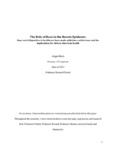| dc.rights.license | In Copyright | en_US |
| dc.creator | Block, Abigail Catherine | |
| dc.date.accessioned | 2017-05-19T13:19:46Z | |
| dc.date.available | 2017-05-19T13:19:46Z | |
| dc.date.created | 2017 | |
| dc.identifier | WLURG38_Block_POV_2017 | |
| dc.identifier.uri | http://hdl.handle.net/11021/33851 | |
| dc.description | Abigail Catherine Block is a member of the Class of 2017 of Washington and Lee University. | en_US |
| dc.description | Capstone; [FULL-TEXT FREELY AVAILABLE ONLINE] | en_US |
| dc.description.abstract | Opioid-related addiction has been propelled by opioid treatment within the healthcare system. The addictive nature of these drugs was underestimated, leading to opioid and heroin addiction in many patients who were treated for chronic pain. The public has addressed the current heroin epidemic sympathetically, acknowledging addiction as a disease and offering healthcare treatment as a remedy. This has been a positive shift from the “tough on crime” agenda perpetuated by the War on Drugs. It also coincides with another shift in drug abuse—racial demographics. White Americans have been more affected by heroin than any other illicit drug. African Americans use heroin and prescription opioids less often because they've been left unexposed. Because African Americans receive disparate levels of treatment within the healthcare system, especially regarding pain treatment, they have not received prescription opioids and have thus been insulated from the epidemic. This newfound sympathy for Caucasian victims was non-existent when minority populations were disproportionately plagued with addiction. This issue stems from two healthcare failures that require action: first for equitable health generally, as provided by the U.S. healthcare system, and second, for non-preferential addiction responses. | en_US |
| dc.description.statementofresponsibility | Abigail Block | |
| dc.format.extent | 31 pages | en_US |
| dc.language.iso | en_US | en_US |
| dc.rights | This material is made available for use in research, teaching, and private study, pursuant to U.S. Copyright law. The user assumes full responsibility for any use of the materials, including but not limited to, infringement of copyright and publication rights of reproduced materials. Any materials used should be fully credited with the source. | en_US |
| dc.rights.uri | http://rightsstatements.org/vocab/InC/1.0/ | en_US |
| dc.subject.other | Washington and Lee University, Shepherd Poverty Program | en_US |
| dc.title | The Role of Race in the Heroin Epidemic | en_US |
| dc.type | Text | en_US |
| dcterms.isPartOf | RG38 - Student Papers | |
| dc.rights.holder | Block, Abigail Catherine | |
| dc.subject.fast | Discrimination in medical care | en_US |
| dc.subject.fast | Drug addiction -- Treatment | en_US |
| dc.subject.fast | Public health | en_US |
| local.department | Shepherd Poverty Program | en_US |
| local.scholarshiptype | Capstone | en_US |
